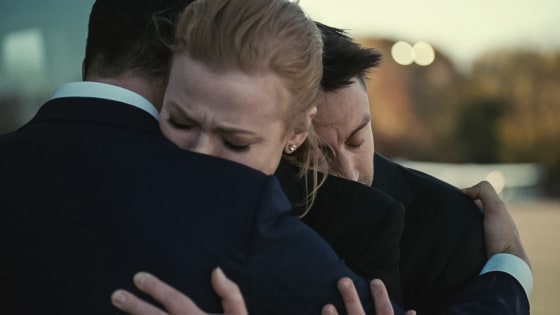A month before HBO premiered season four of the smash hit “Succession,” Jesse Armstrong confirmed in an interview that this would be the series’ last. Seemingly inherent in this declaration was the understanding that the lead character, the family patriarch and CEO of Waystar Royco, Logan Roy (Brian Cox), would pass away by the finale. However, HBO loves itself a red wedding (not to mention a surprising offing), and “Succession” filled both those briefs with episode three.
Warning: Spoilers for “Succession” season four follow.
In what may be one of the greatest TV episodes of all time — and will certainly be a 2023 Emmy submission — “Succession” killed off Logan Roy in the most unexpected way possible: quietly and off-screen. (In an interview with “Deadline,” Cox said he was not even on set for the filming of this episode.) It was tremendous television. And the loss of Logan, the roaring lion at the show’s heart, provided a master class in how to capture modern grief by focusing on those helplessly left shellshocked thousands of miles away.
Narrated by his lackey, Tom (Matthew Macfadyen), Logan’s death is told Shakespeare-style, in a stop-and-start explanation given over speakerphone to Logan’s three children by his second wife. Siblings Kendall (Jeremy Strong), Roman (Kieran Culkin) and Shiv (Sarah Snook) have been fighting for three seasons to succeed their father as CEO. It’s a fight that has divided the family, both emotionally and literally.
Logan and Tom were midair on a private jet flying to Europe when the titan collapsed. The kids, along with their older half-brother, Connor (Alan Ruck), were on a cruise for Connor’s wedding, thousands of miles away. This is perhaps the only part of the episode that’s a little on the nose: Logan’s children remain physically adrift even as they become emotionally unmoored. But the setting also adds another wrinkle to the cycles of loss and denial, as cell service falters and voices cut in and out.
The emotions of the episode are transformed and manipulated through the lens of social separation.
The emotions of the episode are transformed and manipulated through the lens of social separation. Because right now, death too often feels surreal. Covid and social media have added to this feeling, as society has spent years grieving loved ones we were never able to properly say goodbye to. Meanwhile millions mourn people they’ve never met "IRL."
The Roy siblings’ emotionally remote relationship with their father becomes an illustration of the physically remote nature of grief. Logan passes before anyone even knows what’s going on; Tom’s disjointed explanation is that he went to the lavatory and didn’t come back. The flight crew gives the body medical attention, but it’s an after-the-fact pantomime. Tom, meanwhile, keeps up appearances, and pretenses, allowing all three siblings to talk privately to the man who was both their emotional abuser and guiding light, propping the phone up next to the lifeless body. Kendall’s “I can’t forgive you, but it’s OK; I love you” is the perfect summation of what each says in turn. Even Shiv, Tom’s soon-to-be-ex-wife, recognizes what her husband is doing but eventually gives in anyway with a heartbreaking “I love you, Daddy.”
Even before the pandemic, we increasingly learned of the passing of those we knew and cared about via phone and then email and more recently social media. Who hasn’t had to order an older family member not to post about so-and-so’s passing on Facebook until everyone in the immediate family knows? Our interconnectedness can turn death into a disconnected moment of voyeurism — staring at a screen alone in a cubicle, at a phone in the car, with no one to share in the pain.
Our interconnectedness can turn death into a disconnected moment of voyeurism.
TV critics and HBO marketing will highlight the technical aspects of the episode, which is backboned by a single 27-minute continuous take, effectively creating a half-hour one-act play. However, what makes the scene so deeply affecting isn’t the shocking nature of Logan’s passing or the actors’ completing 28 pages of dialogue in a single run. It’s the loneliness that infuses each character’s physical reaction to the news: Kendall wandering out to look over the water every time he can’t handle the conversation, Shiv wrapping pillows to her torso like a shield, Roman making himself into a tiny ball on the floor, like he’s not even able to handle furniture. Culkin’s performance is remarkable — as the one with the most attachment to Logan, he retreats into complete denial, and he is the only sibling who goes to see the body.
Since 2020, “remote relationships” have become a near-universal experience in Western culture and on screen. The Pearsons in NBC’s “This Is Us” Zoom called one another with their new babies, for example; FaceTiming characters have come ubiquitous. Dramatic moments in modern films increasingly feature people alone, typing away. But they rarely deal with how we confront loss through those flickering screens. “Succession” will be known for doing many big, loud things well. But the power of this episode lies in 27 small, quiet and at times excruciating minutes.
